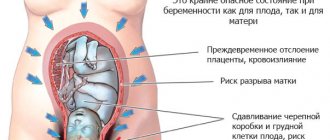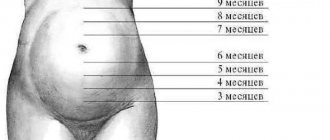9th month of pregnancy The long journey is almost over. There are only a few weeks left, which are exciting in their own way. You are looking forward to meeting your baby. I wonder who he will look like? The fear of childbirth in the last weeks, as a rule, recedes, since all your thoughts are aimed at timely identifying the first harbingers of the onset of labor. On top of that, you've definitely been tired over the last few months, and you want to give birth quickly.
For convenience, the gestational age is calculated in weeks. An obstetric month is 4 weeks – 28 days. This number differs from the calendar number we are used to, and 9 months of pregnancy, according to medical calculations, are equal to 36 weeks (or calendar 39-40).
Baby in the ninth month
By the end of the term, your baby is already comfortably positioned upside down. If the child is “sitting” (breech presentation) or lying sideways, the gynecologist recommends a cesarean section. The child is already big, strong, and quickly gains weight to the required 3-4 kg. All internal organs are formed, so in case of premature birth there is no threat to life. He is a little cramped inside his mother, so he is not very mobile. Excessive fetal energy may be a sign of lack of oxygen. You should definitely tell your doctor about this.
What else is characteristic of a nine-month fetus?
- The skin turns pink, touching folds and “constrictions” appear on the wrists and shins.
- The immune system is strengthened.
- The child distinguishes voices, feels touch, pushes with a frequency of up to 10 times every 12 hours.
Baby in the ninth month
Month names
Except for the first, all months have the same ending “Let”, i.e. Summer (the letter Er (Ъ) is read - “O” kr.), because they are all parts of Summer, and which part is indicated by the first “syllable”.
1. Ramkhat - Divine principle. 2. AiLet – the month of new gifts, i.e. the entire harvest was harvested. 3. BeyLet - the month of white radiance and peace of the World. 4. GayLet - the month of blizzards and cold (this is the current name). Although the concept of “gay” (through E, not gay, there were no gays) here means “change”, “changeability”, i.e. change for the better, which is why in Yugoslavia there was an anthem: “Hey, Slavs!” 5. Day Let - the month of the awakening of nature. Those. think about the word “DayLet” - the giver of Summer. 6. Elet – the month of sowing and naming, i.e. During this month, seeds were sown in the ground and naming ceremonies took place. But the original name was a month of waiting, i.e. They expected changes after the ritual, and waited for the seeds to sprout. And note, the form “E” has remained to this day in the image of expectation, for example, when a person wants to say something, “Eh” bursts out, i.e. wait, now I will formulate. 7. WeiLet – month of winds. 8. HeyLet is the month of receiving the first gifts of nature. 9. Thai Let – month of completion. “Tai” is the top, i.e. Summer is ending. Hence Taiga - the end of the path, the end of the path.
Feelings in the ninth month
For most women, the last month of pregnancy is extremely difficult, both mentally and physically. The stomach feels huge, it becomes more difficult to move, but easier to breathe. The descending uterus creates pain above the pubis, along the inner side of the thigh, in the sacrum.
A woman suffers from insomnia. The background of anxiety is growing, hormones rule the roost, and the expectant mother experiences nervousness. At this stage, you can drink mild sedatives, herbal tea, and engage in mental self-soothing practices. It is important to seek support from your spouse (partner).
Due to progesterone, swelling of the face, legs, hands and fingers becomes more noticeable. You can reduce swelling by moderating the amount of salty and smoked foods in your diet, focusing on milk, tea with citrus and dried apricots as a healthy snack.
Belly at nine months
The tummy no longer grows quickly, its volume remains the same, although the fetus itself increases inside. The lower abdomen hurts and pulls as the baby moves down and puts pressure on the mother’s pubic and pelvic bones.
The female figure now looks like a pear - the stomach has significantly “slipped” down. If you notice a sudden hardening of the abdomen, this means that the uterus is in good shape and is ready to begin labor at any moment.
Your stomach is also itching terribly. This is due to the tension of the skin, which, among other things, also peels off. During this period, you need to lubricate your tummy with moisturizer or cosmetic oil.
Heartburn continues with renewed vigor. Small meals can help get rid of it: little by little, but often.
If the stomach is strongly pulled downwards, contractions begin with a frequency of once every 10-12 minutes, you should prepare: labor has begun. Calmly call an ambulance, take an exchange card and things, and go to the maternity hospital.
Belly at nine months
Well-being of a pregnant woman at 9 months
By this month, mommy is already tired of her situation and dreams of giving birth as soon as possible. The state of health of a pregnant woman at 9 months is the worst for the entire pregnancy, despite the fact that the stomach has already dropped and it has become easier to breathe and suffers less from heartburn. Due to the great pressure on the uterus, the urge to urinate has become more frequent; pain in the perineum and lower back increased; the condition of the veins in the legs worsened, swelling became stronger; Due to constipation, hemorrhoids are more common. If mommy stands on her feet for a long time, she may feel an unpleasant tingling sensation in her legs. The breasts swell even more and continue to prepare for breastfeeding, and at times you can see colostrum being released.
A large belly not only interferes with movement, but also creates other inconveniences: it is harder for mom to do household chores, put on shoes, get dressed, walk, sleep and stand for a long time.
As already mentioned, the baby has occupied the entire uterus, so the mother feels every movement of the baby, especially strong kicks to the ribs. However, at this stage there is a decrease in the baby’s activity due to his large growth and cramped space. In addition, he gains strength before childbirth.
At this stage, the placenta quickly ages and performs its functions differently than in previous months. And your child’s nutrition and “breathing” directly depend on its functioning. Therefore, as before, continue to monitor the number of movements, since excessive activity of the fetus and subsequent passivity may indicate an insufficient amount of oxygen (hypoxia).
After 8 months of pregnancy, the number of movements should be at least 10 times over 6 hours. If you observe the baby's activity for 12 hours, the baby should move about 24 times.
Important!
If you do not notice any movements within 8 hours or feel weak and sluggish movements, be sure to see a doctor! He will listen to the fetal heartbeat and refer you for cardiotocography (CTG) and fetal Doppler ultrasound.
The volume of the abdomen at the end of the month is approximately 95-100 cm, this could not but affect the skin - it is so stretched that the pregnant woman experiences severe itching. Some mothers notice stretch marks (stretch marks on the thighs and abdomen).
Striae on the stomach of a pregnant woman
It is very difficult to get rid of stretch marks after childbirth; it is easier to prevent using moisturizers. The height of the uterine fundus at this stage is 34-38 cm. Weight gain at the end of the 9th month relative to the “pre-pregnancy” weight can range from 10 to 15 kg. During the last weeks of pregnancy, weight gain should be no more than 300 grams in 7 days. It is worth noting that the more weight a mother had before pregnancy, the less she will gain during the entire pregnancy period and vice versa.
Recommendations for the ninth month
The diet, as throughout pregnancy, should be balanced and complete. The menu is chosen competently and fully, and meals are arranged according to the hour. Focus on dairy products, dietary meat - beef and turkey, fibrous vegetables, cereals and dried fruits. Listen to your body and your baby, who will accurately tell you what to eat and what to avoid.
The mistake of many expectant mothers is that, having learned about their situation, they begin to eat for two, while the child has enough substances coming from the woman’s standard menu. The result is weight gain, criticism from the gynecologist, difficulties during childbirth and complexes about appearance after it. Eat deliciously: not little, not much, but enough. Cook by steaming and in the oven, avoid public catering and fast food.
Recommendations for the ninth month of pregnancy
Fees for the maternity hospital
The main task at this important stage is to rest more and gain strength, you will definitely need them. Don't forget to pack your bags for the maternity hospital; they should be ready starting from the 38th week. Many women either take a lot of extra things with them, or, conversely, don’t know exactly what to take. Every maternity hospital has a similar list, since the requirements are different.
But if you haven’t had time to clarify, you can assemble an “alarm suitcase” according to the following scheme. You will need 3 packages. The first is for, the second is for the child, and the third is for you and your baby’s discharge. As a rule, all this will be delivered to you the next day after the birth, since you are not allowed to take anything with you to the birth except documents, water and a cell phone. Don’t forget your passport, birth certificate, exchange card, compulsory medical and pension insurance policies.
In the postpartum department you will need disposable panties, pads, nursing bras and special bra inserts, wash and hygiene products, a towel, wet wipes, a postpartum bandage, Bepanten cream for cracked nipples, rubber slippers, and, at your discretion, a robe and nightgown, breast pump, dishes.
The baby needs to buy a package of newborn diapers, wet wipes, bath product and diaper cream. When you leave, pack things for your baby and yourself, taking into account the season. You shouldn’t wrap your baby tightly, as it’s more likely to cause a cold.
Things have been collected, everything is ready for the baby’s arrival, all that’s left is to wait. Try to relax, read about proper breathing during childbirth, if you haven’t studied it in courses. Ask your doctor for more information about signs of labor. These include contractions, the release of mucus plugs, and increased urination. Be on the alert, as soon as contractions begin to bother you at an equal interval, and it will gradually decrease, go to the maternity hospital or call an ambulance. Don't panic, you're not the first and you won't be the last to go through this. It’s better to think about how you will see your baby for the first time, how you will tenderly hold him close to you and the whole world around you two will become invisible.
Seasons and month
Now the division is not ours, the annual cycle is divided into 4 seasons, and our Ancestors divided it into 3 periods, the names are known - Autumn (i.e. when they found themselves under the shadow of the atmosphere), Winter, Spring , and all together they were called in one word SUMMER . That’s why they ask: “How old are you?” There is a chronicle and a chronicler, but there is no “chronicle”.
Each season (Summer) was divided into 3 months, i.e. Summer lasted 9 months . But today we have adopted a calendar system that is very inconvenient for counting, i.e. There are months of 31 days, 30 days, 29 and 28 days. The year is divided into 12 months (12 different tablets) and it is not known on what day the month will begin. The Slavic calendar is much more convenient , there are only 2 tablets - odd months have 41 days , even months have 40 days , so if Summer (year) began on Monday, then all odd months (1, 3, 5, 7, 9) will begin on Monday, and even ones at six. Everything is simple and convenient. Our Ancestors could easily calculate what day of the week it was thousands and even hundreds of thousands of years ago. Because in Krugolet itself, every year begins on a certain day of the week. * During Holy Summer, all months have 41 days.









